Play video — original link
Play video
Play video
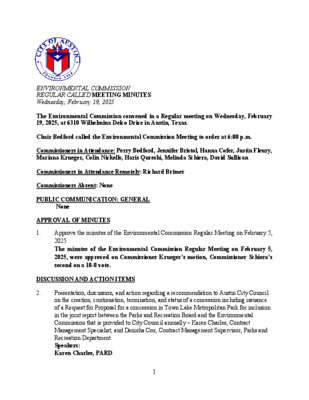
ENVIRONMENTAL COMMISSION REGULAR CALLED MEETING MINUTES Wednesday, February 19, 2025 The Environmental Commission convened in a Regular meeting on Wednesday, February 19, 2025, at 6310 Wilhelmina Delco Drive in Austin, Texas. Chair Bedford called the Environmental Commission Meeting to order at 6:00 p.m. Commissioners in Attendance: Perry Bedford, Jennifer Bristol, Hanna Cofer, Justin Fleury, Mariana Krueger, Colin Nickells, Haris Qureshi, Melinda Schiera, David Sullivan Commissioners in Attendance Remotely: Richard Brimer Commissioners Absent: None PUBLIC COMMUNICATION: GENERAL None APPROVAL OF MINUTES Approve the minutes of the Environmental Commission Regular Meeting on February 5, 2025 The minutes of the Environmental Commission Regular Meeting on February 5, 2025, were approved on Commissioner Krueger’s motion, Commissioner Schiera’s second on a 10-0 vote. DISCUSSION AND ACTION ITEMS Presentation, discussion, and action regarding a recommendation to Austin City Council on the creation, continuation, termination, and status of a concession including issuance of a Request for Proposal for a concession in Town Lake Metropolitan Park for inclusion in the joint report between the Parks and Recreation Board and the Environmental Commission that is provided to City Council annually – Karen Charles, Contract Management Specialist, and Denisha Cox, Contract Management Supervisor, Parks and Recreation Department. Speakers: Karen Charles, PARD 1 1. 2. Denisha Cox, PARD Pat Rossett, PARD Jesús Aguirre, PARD Christine Chute Canul, PARD Holly Reed Ricardo Chavana Dorothy Barnett Laura Massengale Craig Nazor Phil Thomas Bertha Rendon Delgado Ted Eubanks A motion to recommend the PARD concessions report was made on Commissioner Bristol’s motion and Commissioner Kruger’s second. An amendment to the original motion to state the commission “approves the 2024 concessions report acknowledging that staff meets the current code” passed on Commissioner Sullivan’s motion, seconded by Commissioner Bristol, on an 8-1 vote. Commissioner Brimer voted against. Commissioner Cofer recused from the agenda item. An amendment by Commissioner Brimer to delay the implementation of Phase II of the Trail Conservancy POMA passed with no objection. Commissioner Cofer recused from the agenda item. An amendment to delay the implementation of the Expedition School concession failed due to a lack of a second. Commissioner Cofer recused from the agenda item. The original motion with amendments passed on an 8-1 vote. Commissioner Brimer voted against. Commissioner Cofer recused from the agenda item. Discussion and recommendation on the Draft Environmental Impact Statement for Austin Light Rail – Commissioners Sullivan and Qureshi A motion to postpone the draft environmental impact statement …
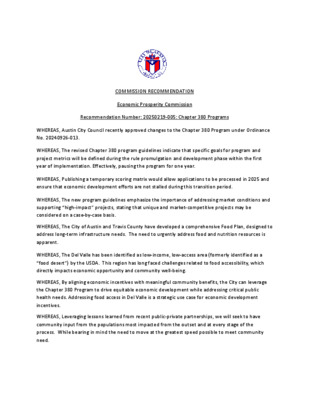
COMMISSION RECOMMENDATION Economic Prosperity Commission Recommendation Number: 20250219-005: Chapter 380 Programs WHEREAS, Austin City Council recently approved changes to the Chapter 380 Program under Ordinance No. 20240926-013. WHEREAS, The revised Chapter 380 program guidelines indicate that specific goals for program and project metrics will be defined during the rule promulgation and development phase within the first year of implementation. Effectively, pausing the program for one year. WHEREAS, Publishing a temporary scoring matrix would allow applications to be processed in 2025 and ensure that economic development efforts are not stalled during this transition period. WHEREAS, The new program guidelines emphasize the importance of addressing market conditions and supporting “high-impact” projects, stating that unique and market-competitive projects may be considered on a case-by-case basis. WHEREAS, The City of Austin and Travis County have developed a comprehensive Food Plan, designed to address long-term infrastructure needs. The need to urgently address food and nutrition resources is apparent. WHEREAS, The Del Valle has been identified as low-income, low-access area (formerly identified as a “food desert”) by the USDA. This region has long faced challenges related to food accessibility, which directly impacts economic opportunity and community well-being. WHEREAS, By aligning economic incentives with meaningful community benefits, the City can leverage the Chapter 380 Program to drive equitable economic development while addressing critical public health needs. Addressing food access in Del Valle is a strategic use case for economic development incentives. WHEREAS, Leveraging lessons learned from recent public-private partnerships, we will seek to have community input from the populations most impacted from the outset and at every stage of the process. While bearing in mind the need to move at the greatest speed possible to meet community need. NOW, THEREFORE, BE IT RESOLVED that the Economic Prosperity Commission recommends that the City publish a temporary scoring matrix for Chapter 380 Programs; BE IT FURTHER RESOLVED that the Economic Prosperity Commission recommends that the City develop an incentive program that directly supports businesses and initiatives that enhance access to healthy food options in Del Valle. Date of Approval: February 19, 2025 Record of the vote: Motioned by: Chair Michael Nahas Seconded by: Commissioner Amy Rister Vote: 8-0 Against: None Abstain: None Absent: Commissioners Attest: _____________________________________________ For: Chair Nahas, Commissioners Gonzales, Hitchingham, Noel, Rister, Valdez Sanchez, Zapata
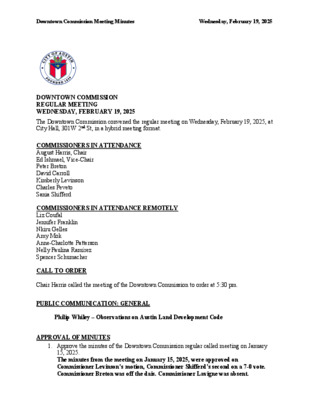
Downtown Commission Meeting Minutes Wednesday, February 19, 2025 DOWNTOWN COMMISSION REGULAR MEETING WEDNESDAY, FEBRUARY 19, 2025 The Downtown Commission convened the regular meeting on Wednesday, February 19, 2025, at City Hall, 301W 2nd St, in a hybrid meeting format. COMMISSIONERS IN ATTENDANCE August Harris, Chair Ed Ishmael, Vice-Chair Peter Breton David Carroll Kimberly Levinson Charles Peveto Sania Shifferd COMMISSIONERS IN ATTENDANCE REMOTELY Liz Coufal Jennifer Franklin Nkiru Gelles Amy Mok Anne-Charlotte Patterson Nelly Paulina Ramírez Spencer Schumacher CALL TO ORDER Chair Harris called the meeting of the Downtown Commission to order at 5:30 pm. PUBLIC COMMUNICATION: GENERAL Philip Whiley – Observations on Austin Land Development Code APPROVAL OF MINUTES 1. Approve the minutes of the Downtown Commission regular called meeting on January 15, 2025. The minutes from the meeting on January 15, 2025, were approved on Commissioner Levinson’s motion, Commissioner Shifferd’s second on a 7-0 vote. Commissioner Breton was off the dais. Commissioner Lavigne was absent. Downtown Commission Meeting Minutes Wednesday, February 19, 2025 STAFF BRIEFINGS 2. Staff briefing regarding the Seaholm area multi-modal improvements by Alex Payson, Capital Improvement Program Manager, Austin Transportation and Public Works. The presentation was made by Alex Payson, Capital Improvement Program Manager, Austin Transportation and Public Works. DISCUSSION ITEMS 3. Update on the progress of the Austin Light Rail. Presentation by Austin Transit Partnership staff. The presentation was made by Sean Barry and Deron Lozano, Austin Transit Partnership. 4. Discussion of the proposed reorganization of certain Boards and Commissions as outlined in Austin City Council Resolution 20241212-133. Discussed. DISCUSSION AND ACTION ITEM 5. Approve a Recommendation to Council regarding High Level Goals for the Downtown Austin Plan Update. The motion to approve a Recommendation to Council regarding High Level Goals for the Downtown Austin Plan Update was approved on Commissioner Levinson’s motion, Commissioner Peveto’s second, on an 8-0 vote. Commissioner Lavigne was absent. Election of officers in April FUTURE AGENDA ITEMS ADJOURNMENT Chair Harris adjourned the meeting at 6:36 pm without any objection. The minutes were approved at the March 19, 2025, meeting on Commissioner Peveto’s motion, Commissioner Levinson’s second on a 7-0 vote. Commissioner Breton was absent.
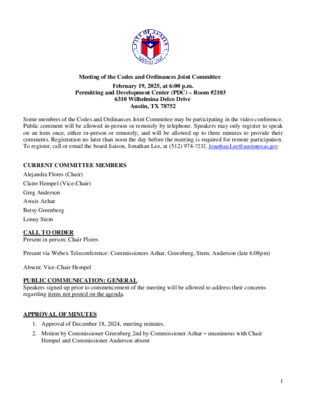
Meeting of the Codes and Ordinances Joint Committee February 19, 2025, at 6:00 p.m. Permitting and Development Center (PDC) – Room #2103 6310 Wilhelmina Delco Drive Austin, TX 78752 Some members of the Codes and Ordinances Joint Committee may be participating in the video conference. Public comment will be allowed in-person or remotely by telephone. Speakers may only register to speak on an item once, either in-person or remotely, and will be allowed up to three minutes to provide their comments. Registration no later than noon the day before the meeting is required for remote participation. To register, call or email the board liaison, Jonathan Lee, at (512) 974-7232, Jonathan.Lee@austintexas.gov. CURRENT COMMITTEE MEMBERS Alejandra Flores (Chair) Claire Hempel (Vice-Chair) Greg Anderson Awais Azhar Betsy Greenberg Lonny Stern CALL TO ORDER Present in person: Chair Flores Present via Webex Teleconference: Commissioners Azhar, Greenberg, Stern, Anderson (late 6:08pm) Absent: Vice-Chair Hempel PUBLIC COMMUNICATION: GENERAL Speakers signed up prior to commencement of the meeting will be allowed to address their concerns regarding items not posted on the agenda. APPROVAL OF MINUTES 1. Approval of December 18, 2024, meeting minutes. 2. Motion by Commissioner Greenberg 2nd by Commissioner Azhar – unanimous with Chair Hempel and Commissioner Anderson absent 1 DISCUSSION AND ACTION ITEMS 2. C20-2024-024 Area Plan Process Amendment. Discussion and possible action to recommend amendments to City Code Title 25 (Land Development) to specify an amendment process for area plans, including station area vision plans, when process is not already defined in another section of City code. City Staff: Stevie Greathouse, Division Manager, (512) 974-7226, Stevie.Greathouse@austintexas.gov. Stevie Greathouse presented. On a motion by Commissioner Greenberg and a second by Commissioner Azhar, the Committee voted 4-0 to recommend the proposed amendments, with Commissioner Anderson off the dais and Vice-Chair Hempel absent. 3. Update on Active and Upcoming Code Amendments. City Staff: Jonathan Lee, Planning Department, DISCUSSION ITEMS (512) 974-7232, Jonathan.Lee@austintexas.gov. Jonathan Lee presented. FUTURE AGENDA ITEMS Staff briefing on existing zoning regulations and active code amendments in the North Burnet/Gateway area. Sponsor: Commissioner Stern. Discussion and possible action on code amendments related to commercial uses in the Density Bonus 90 (DB-90) program. Sponsor: Commissioner Greenberg. ADJOURNMENT Adjourned at 6:55pm The City of Austin is committed to compliance with the American with Disabilities Act. Reasonable modifications and equal access to communications will be provided upon request. Meeting locations are planned with wheelchair access. If requiring …
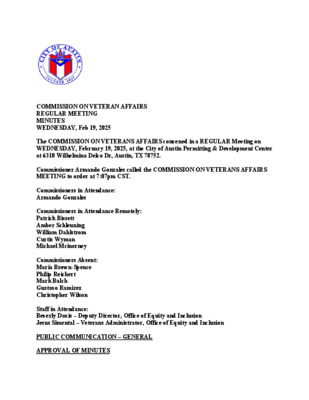
COMMISSION ON VETERAN AFFAIRS REGULAR MEETING MINUTES WEDNESDAY, Feb 19, 2025 The COMMISSION ON VETERANS AFFAIRS convened in a REGULAR Meeting on WEDNESDAY, February 19, 2025, at the City of Austin Permitting & Development Center at 6310 Wilhelmina Delco Dr, Austin, TX 78752. Commissioner Armando Gonzales called the COMMISSION ON VETERANS AFFAIRS MEETING to order at 7:07pm CST. Commissioners in Attendance: Armando Gonzales Commissioners in Attendance Remotely: Patrick Bissett Amber Schleuning William Dahlstrom Curtis Wyman Michael Mcinerney Commissioners Absent: Maria Brown-Spence Philip Reichert Mark Balch Gustavo Ramirez Christopher Wilson Staff in Attendance: Beverly Davis – Deputy Director, Office of Equity and Inclusion Jesus Simental – Veterans Administrator, Office of Equity and Inclusion PUBLIC COMMUNICATION – GENERAL APPROVAL OF MINUTES 1. The minutes from the meeting of 1/15/2025 were approved on Commissioner Armando Gonzales’s motion, second by Patrick Bissett on a 6-0 vote. Commissioner Maria Brown-Spence, Mark Balch, Philip Reichert, Gustavo Ramirez, and Christopher Wilson were absent. STAFF BRIEFINGS DISCUSSION ITEMS the March meeting. 2. Staff liaison, Jesus Simental, discussed the use of social media under the newly established Office of Equity and Inclusion. At this point it’s too early to determine how that process is going to work and the use of the Equity social media to get veteran information out to the public, more to follow. 3. Presentation by Kim DeLorenzo from Tunnel to Towers Foundation was rescheduled to 4. Presentation by David Gray from Homeless Strategy Office was rescheduled to the March meeting. DISCUSSION AND ACTION ITEMS the agenda. 5. The only budget resolutions for FY 2025 that was discussed and voted on was item 6 of 6. The Commission discussed the need for a Veteran Resource Center, who it will serve and what agencies would be part of it. Additionally there was discussion on establishment of a veterans affairs office. Recommendation 20250219-006 was generated to stand up a Veteran Resource Center and create a veterans affairs office. A vote was taken to put forth the Recommendation. Commissioner Armando Gonzales motioned and Patrick Bissett second it on a 6-0 vote, Commissioner Maria Brown- Spence, Mark Balch, Philip Reichert, Gustavo Ramirez, and Christoper Wilson were absent. 7. Commissioner Amber Schleuning requested to discuss the veterans survey that was FUTURE AGENDA ITEMS recently disseminated. ADJOURNMENT END: 7:42 PM 8. Commissioner Gonzales made the motion to adjourn, Michael Mcinerney second on a 6- 0 vote. Commissioner Maria Brown-Spence, Mark Balch, Philip …
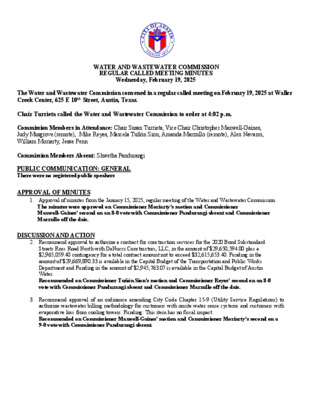
WATER AND WASTEWATER COMMISSION REGULAR CALLED MEETING MINUTES Wednesday, February 19, 2025 The Water and Wastewater Commission convened in a regular called meeting on February 19, 2025 at Waller Creek Center, 625 E 10th Street, Austin, Texas. Chair Turrieta called the Water and Wastewater Commission to order at 4:02 p.m. Commission Members in Attendance: Chair Susan Turrieta, Vice Chair Christopher Maxwell-Gaines, Judy Musgrove (remote), Mike Reyes, Marcela Tuñón Sion, Amanda Marzullo (remote), Alex Navarro, William Moriarty, Jesse Penn Commission Members Absent: Shwetha Pandurangi PUBLIC COMMUNICATION: GENERAL There were no registered public speakers APPROVAL OF MINUTES 1. Approval of minutes from the January 15, 2025, regular meeting of the Water and Wastewater Commission. The minutes were approved on Commissioner Moriarty’s motion and Commissioner Maxwell-Gaines’ second on an 8-0 vote with Commissioner Pandurangi absent and Commissioner Marzullo off the dais. DISCUSSION AND ACTION 2. Recommend approval to authorize a contract for construction services for the 2020 Bond Substandard Streets Ross Road North with DeNucci Constructors, LLC, in the amount of $29,650,594.00 plus a $2,965,059.40 contingency for a total contract amount not to exceed $32,615,653.40. Funding in the amount of $29,669,890.33 is available in the Capital Budget of the Transportation and Public Works Department and Funding in the amount of $2,945,763.07 is available in the Capital Budget of Austin Water. Recommended on Commissioner Tuñón Sion’s motion and Commissioner Reyes’ second on an 8-0 vote with Commissioner Pandurangi absent and Commissioner Marzullo off the dais. 3. Recommend approval of an ordinance amending City Code Chapter 15-9 (Utility Service Regulations) to authorize wastewater billing methodology for customers with onsite water reuse systems and customers with evaporative loss from cooling towers. Funding: This item has no fiscal impact. Recommended on Commissioner Maxwell-Gaines’ motion and Commissioner Moriarty’s second on a 9-0 vote with Commissioner Pandurangi absent. STAFF BRIEFINGS 4. Staff briefing on proposed ordinance amending City Code Chapter 15-9 (Utility Service Regulations) to authorize an alternative wastewater billing methodology for customers with onsite water reuse systems and customers with evaporative loss from cooling towers. Supervising Engineer Katherine Jashinski provided a briefing and answered questions from Commissioners 5. Staff briefing on My ATX Water program implementation update. Assistant Director Randi Jenkins provided a briefing and answered questions from Commissioners COMMITTEE UPDATES 6. Update from the Austin Integrated Water Resource Planning Community Task Force meeting regarding Water Forward Plan implementation – Commissioner William Moriarty provided an update 7. Update …
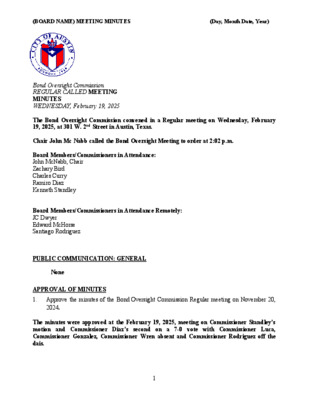
(BOARD NAME) MEETING MINUTES (Day, Month Date, Year) Bond Oversight Commission REGULAR CALLED MEETING MINUTES WEDNESDAY, February 19, 2025 The Bond Oversight Commission convened in a Regular meeting on Wednesday, February 19, 2025, at 301 W. 2nd Street in Austin, Texas. Chair John Mc Nabb called the Bond Oversight Meeting to order at 2:02 p.m. Board Members/Commissioners in Attendance: John McNabb, Chair Zachary Bird Charles Curry Ramiro Diaz Kenneth Standley Board Members/Commissioners in Attendance Remotely: JC Dwyer Edward McHorse Santiago Rodriguez PUBLIC COMMUNICATION: GENERAL None APPROVAL OF MINUTES 1. Approve the minutes of the Bond Oversight Commission Regular meeting on November 20, 2024. The minutes were approved at the February 19, 2025, meeting on Commissioner Standley’s motion and Commissioner Diaz’s second on a 7-0 vote with Commissioner Luca, Commissioner Gonzalez, Commissioner Wren absent and Commissioner Rodriguez off the dais. 1 (BOARD NAME) MEETING MINUTES (Day, Month Date, Year) Staff Briefings 2. Staff Briefing by the Austin Housing Department on the bond programs The presentation was made by Jamey May on the following: • Update on 2018 Bonds • Update on 2022 Bonds FUTURE AGENDA ITEMS Construction timing permitting schedule Chair John McNabb adjourned the meeting at 2:59 p.m. without objection. The minutes were approved at the May 21, 2025, meeting on Chair McNabb’s motion, Commissioner Diaz’s second on a (6-0) vote with Commissioner Libal abstaining and Commissioner Gonzalez and Standley absent. 2 3
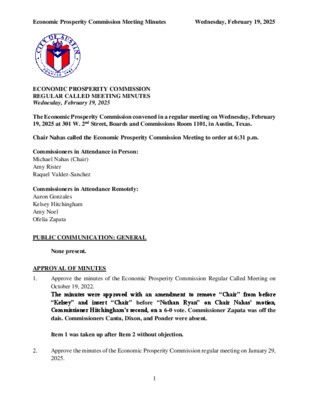
Economic Prosperity Commission Meeting Minutes Wednesday, February 19, 2025 ECONOMIC PROSPERITY COMMISSION REGULAR CALLED MEETING MINUTES Wednesday, February 19, 2025 The Economic Prosperity Commission convened in a regular meeting on Wednesday, February 19, 2025 at 301 W. 2nd Street, Boards and Commissions Room 1101, in Austin, Texas. Chair Nahas called the Economic Prosperity Commission Meeting to order at 6:31 p.m. Commissioners in Attendance in Person: Michael Nahas (Chair) Amy Rister Raquel Valdez-Sanchez Commissioners in Attendance Remotely: Aaron Gonzales Kelsey Hitchingham Amy Noel Ofelia Zapata PUBLIC COMMUNICATION: GENERAL None present. APPROVAL OF MINUTES 1. Approve the minutes of the Economic Prosperity Commission Regular Called Meeting on October 19, 2022. The minutes were approved with an amendment to remove “Chair” from before “Kelsey” and insert “Chair” before “Nathan Ryan” on Chair Nahas’ motion, Commissioner Hitchingham’s second, on a 6-0 vote. Commissioner Zapata was off the dais. Commissioners Cantu, Dixon, and Ponder were absent. Item 1 was taken up after Item 2 without objection. 2. Approve the minutes of the Economic Prosperity Commission regular meeting on January 29, 2025. 1 Economic Prosperity Commission Meeting Minutes Wednesday, February 19, 2025 The minutes were approved without objection on Chair Nahas’ motion on a 6-0 vote. Commissioner Zapata was off the dais. Commissioners Cantu, Dixon, and Ponder were absent. DISCUSSION ITEMS 3. Discussion on the long-term goals and strategic planning of the Economic Prosperity Commission. Discussion was held. DISCUSSION AND ACTION ITEMS 4. 5. Conduct an emergency election for a Vice Chair of the Economic Prosperity Commission. Commissioner Rister was nominated for the role of Vice Chair by Chair Nahas, second by Commissioner Zapata. Commissioner Rister was elected as Vice Chair on Chair Nahas’ motion, Commissioner Zapata’s second on a 7-0 vote. Commissioners Cantu, Dixon, and Ponder were absent. Item 4 was taken up after Item 5 without objection. Discussion and possible action on a recommendation regarding Chapter 380 programs. The below recommendation was approved on Chair Nahas’ motion, Commissioner Rister’s second, on a 7-0 vote. Commissioners Cantu, Dixon, and Ponder were absent. WHERE AS: Austin City Council recently approved changes to the Chapter 380 Program under Ordinance No. 20240926-013. WHERE AS: The revised Chapter 380 program guidelines indicate that specific goals for program and project metrics will be defined during the rule promulgation and development phase within the first year of implementation. Effectively, pausing the program for one year. WHERE AS: Publishing a temporary scoring …
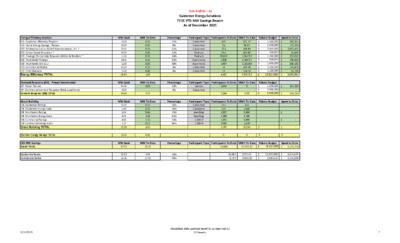
Energy Efficiency Services EES- Appliance Efficiency Program EES- Home Energy Savings - Rebate EES- AE Weatherization & CAP Weatherization - D.I. * EES- School Based Education * EES- Strategic Partnership Between Utilities & Retailers * EES- Multifamily Rebates EES- Multifamily WX-D.I.+ EES- Commercial Rebate EES- Small Business Energy Efficiency TOTAL Demand Response (DR) - Annual Incremental DR- Power Partner DR- Commercial Demand Response (frmly Load Coop) Demand Response (DR) TOTAL Green Building GB- Residential Ratings GB- Residential Energy Code GB- Multifamily Ratings GB- Multifamily Energy Code GB- Commercial Ratings GB- Commercial Energy Code Green Building TOTAL CES MW Savings Grand TOTAL Residential Totals Commercial Totals Non-Public - AE# Customer Energy Solutions FY25 YTD MW Savings Report As of December 2025 Participant Type Participants To Date MWh To Date Rebate Budget MW Goal 2.60 0.90 0.44 0.30 1.75 0.65 1.00 6.00 2.00 15.64 MW Goal 6.40 2.00 8.40 MW Goal 0.35 1.48 1.34 4.41 4.60 1.71 13.89 MW To Date 0.30 0.07 0.27 0.04 0.25 0.42 0.30 0.25 0.08 1.98 MW To Date 3.33 3.33 MW To Date 0.10 0.30 0.55 2.23 1.10 0.62 4.90 Percentage 12% 8% 61% 12% 14% 65% 30% 4% 4% Percentage 52% 0% Percentage 30% 20% 41% 51% 24% 36% Customers Customers Customers Products Products Apartments Apartments Customers Customers Devices Customers Customers Customers Dwellings Dwellings 1,000 sf 1,000 sf 426 64 333 844 28,619 1,908 1,937 14 11 5,537 2,344 2,344 131 376 1,007 4,285 1,451 2,049 5,799 0 591.27 96.07 499.84 587.86 1,947.32 1,404.37 1,182.68 483.38 134.53 6,927.32 $ 1,500,000 $ 1,600,000 $ 2,577,000 $ 350,000 $ 1,250,000 $ 900,000 $ 1,800,000 $ 2,250,000 $ 1,100,000 $ 13,327,000 Spent to Date $ 202,331 $ 122,225 $ 2,897,421 $ 41,668 $ 210,016 $ 706,602 $ 508,183 $ 136,810 $ 55,728 $ 4,880,984 0 0.00 $ 1,600,000 $ 2,000,000 $ 3,600,000 $ 254,230 $ 254,230 414 2,049 3,866 5,186 8,896 5,630 26,041 $ - $ - $ - $ - 0 $ - $ - Participant Type Participants To Date MWh To Date Rebate Budget Participant Type Participants To Date MWh To Date Rebate Budget Spent to Date MW Goal 37.93 MW To Date 10.21 Percentage Participant Type Participants To Date MWh To Date Rebate Budget 13,680 32,968.32 $ 16,927,000 Spent to Date $ 5,135,214 15.87 14.06 5.38 12.50 34% 89% 36,982 8,791 8772.41 23603.00 $ $ 11,577,000 2,000,618 $ $ 4,942,676 3,350,000 Thermal Energy Storage TOTAL …
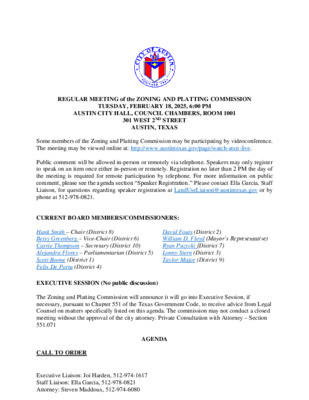
REGULAR MEETING of the ZONING AND PLATTING COMMISSION TUESDAY, FEBRUARY 18, 2025, 6:00 PM AUSTIN CITY HALL, COUNCIL CHAMBERS, ROOM 1001 301 WEST 2ND STREET AUSTIN, TEXAS Some members of the Zoning and Platting Commission may be participating by videoconference. The meeting may be viewed online at: http://www.austintexas.gov/page/watch-atxn-live. Public comment will be allowed in-person or remotely via telephone. Speakers may only register to speak on an item once either in-person or remotely. Registration no later than 2 PM the day of the meeting is required for remote participation by telephone. For more information on public comment, please see the agenda section “Speaker Registration.” Please contact Ella Garcia, Staff Liaison, for questions regarding speaker registration at LandUseLiaison@austintexas.gov or by phone at 512-978-0821. CURRENT BOARD MEMBERS/COMMISSIONERS: Hank Smith – Chair (District 8) Betsy Greenberg – Vice-Chair (District 6) Carrie Thompson – Secretary (District 10) Alejandra Flores – Parliamentarian (District 5) Scott Boone (District 1) Felix De Portu (District 4) David Fouts (District 2) William D. Floyd (Mayor’s Representative) Ryan Puzycki (District 7) Lonny Stern (District 3) Taylor Major (District 9) EXECUTIVE SESSION (No public discussion) The Zoning and Platting Commission will announce it will go into Executive Session, if necessary, pursuant to Chapter 551 of the Texas Government Code, to receive advice from Legal Counsel on matters specifically listed on this agenda. The commission may not conduct a closed meeting without the approval of the city attorney. Private Consultation with Attorney – Section 551.071 AGENDA CALL TO ORDER Executive Liaison: Joi Harden, 512-974-1617 Staff Liaison: Ella Garcia, 512-978-0821 Attorney: Steven Maddoux, 512-974-6080 PUBLIC COMMUNICATION: GENERAL The first four speakers signed up prior to the meeting being called to order will each be allowed a three-minute allotment to address their concerns regarding items not posted on the agenda. APPROVAL OF MINUTES 1. Approve the minutes of the Zoning and Platting Commission regular meeting on February 6, 2025. PUBLIC HEARINGS C14-2024-0177 - 2311 W. Howard Lane Project; District 7 2311 West Howard Lane, Walnut Creek 2. Rezoning: Location: Owner/Applicant: Duque Estates, LLC (Gabriel Aviles) Agent: Request: Staff Rec.: Staff: I.T. Gonzalez Engineers (Bill Graham) GR to CS Recommended Sherri Sirwaitis, 512-974-3057, sherri.sirwaitis@austinxas.gov Planning Department 3. Rezoning: C14-2024-0169 - Zimmerman SF North; District 6 11300 Zimmerman Lane, Bull Creek Watershed Location: Owner/Applicant: Barbara Allen Agnew and Brian Matthew Smith Agent: Request: Staff Rec.: Staff: Jackson Walker LLP (Pamela Madere) DR to SF-6 Recommended Sherri Sirwaitis, …
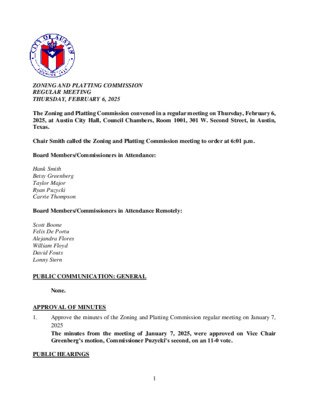
ZONING AND PLATTING COMMISSION REGULAR MEETING THURSDAY, FEBRUARY 6, 2025 The Zoning and Platting Commission convened in a regular meeting on Thursday, February 6, 2025, at Austin City Hall, Council Chambers, Room 1001, 301 W. Second Street, in Austin, Texas. Chair Smith called the Zoning and Platting Commission meeting to order at 6:01 p.m. Board Members/Commissioners in Attendance: Hank Smith Betsy Greenberg Taylor Major Ryan Puzycki Carrie Thompson Board Members/Commissioners in Attendance Remotely: Scott Boone Felix De Portu Alejandra Flores William Floyd David Fouts Lonny Stern PUBLIC COMMUNICATION: GENERAL None. APPROVAL OF MINUTES Approve the minutes of the Zoning and Platting Commission regular meeting on January 7, 2025 The minutes from the meeting of January 7, 2025, were approved on Vice Chair Greenberg’s motion, Commissioner Puzycki’s second, on an 11-0 vote. PUBLIC HEARINGS 1. 1 C14H-2024-0162 - Running Rope Ranch; District 10 7304 Knox Ln., Fort Branch Watershed 2. Historic Zoning: Location: Owner/Applicant: Historic Landmark Commission (owner-opposed) Agent: Request: Staff Rec.: Staff: Owner's agent - Leah Bojo, Drenner Group SF-3 to SF-3-H Recommended Kalan Contreras, 512-974-2727, kalan.contreras@austintexas.gov Planning Department The motion to approve Staff’s recommendation of SF-3-H for C14H-2024-0162 - Running Rope Ranch, located at 7304 Knox Ln., failed on Commissioner Thompson’s motion, Vice Chair Greenberg’s second, on a 3-7 vote. Those voting aye were Vice Chair Greenberg and Commissioners Boone and Thompson. Those voting nay were Commissioners De Portu, Flores, Floyd, Fouts, Puzycki, Major, and Stern. Chair Smith recused from this item due to a conflict of interest and left the dais. C14-2024-0118.SH - 8301 Riverstone; District 1 8301 Riverstone Drive, Elm Creek Watershed 3. Rezoning: Location: Owner/Applicant: 8301 Riverstone LP Agent: Request: Staff Rec.: Staff: Austin Revitalization Authority (Bryan Kight) MF-2 to SF-3 Recommended Jonathan Tomko, 512-974-1057, jonathan.tomko@austintexas.gov Planning Department The motion to approve Staff’s recommendation of SF-3 for C14-2024-0118.SH - 8301 Riverstone, located at 8301 Riverstone Drive, was approved on the consent agenda on Vice Chair Greenberg’s motion, Commissioner Puzycki’s second, on an 11-0 vote. 4. Rezoning: C14-2024-0006 - Greater Walnut Area Centralized Odor Control Facility Project - Loyola Facility; District 1 6101 and 6101 1/2 Loyola Lane, Walnut Creek Watershed Location: Owner/Applicant: City of Austin Agent: Request: Staff Rec.: Staff: City of Austin (Tony Lopez) SF-3 to P Applicant Request for Indefinite Postponement Beverly Villela, 512-978-0740, beverly.villela@austintexas.gov Planning Department The motion to approve the Applicant’s indefinite postponement request was approved on the consent agenda on Vice …
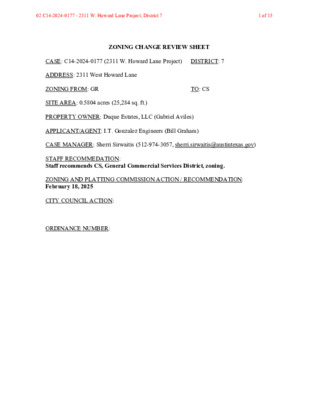
ZONING CHANGE REVIEW SHEET CASE: C14-2024-0177 (2311 W. Howard Lane Project) DISTRICT: 7 ADDRESS: 2311 West Howard Lane ZONING FROM: GR TO: CS SITE AREA: 0.5804 acres (25,284 sq. ft.) PROPERTY OWNER: Duque Estates, LLC (Gabriel Aviles) APPLICANT/AGENT: I.T. Gonzalez Engineers (Bill Graham) CASE MANAGER: Sherri Sirwaitis (512-974-3057, sherri.sirwaitis@austintexas.gov) STAFF RECOMMEDATION: Staff recommends CS, General Commercial Services District, zoning. ZONING AND PLATTING COMMISSION ACTION / RECOMMENDATION: February 18, 2025 CITY COUNCIL ACTION: ORDINANCE NUMBER: 02 C14-2024-0177 - 2311 W. Howard Lane Project; District 71 of 15 C14-2024-0177 ISSUES: 2 On January 24, 2024, a code violation was filed for this property for an Enterprise Violation - case number ECV 2024-010795, for an unpermitted commercial development of site operating a towing service (please see Notice of Violation - Exhibit C). CASE MANAGER COMMENTS: The property under consideration is a 25,284 sq. ft. lot that is currently being utilized for a construction sales and services use (Best Insulation) that fronts onto W. Howard Lane. There are also construction sales and services businesses to the north (ABC Heating and Air Services Supply Co Inc.) in the county and to the west (Demolition Excursion Alliance LLC, Construction Innovators Additions, Bartlett Tree Experts) zoned CS and CS-1-CO respectively. The lots to the east contain a vehicle storage use (Eagle Towing) zoned GR and an office/warehouse use (Jorgenson) zoned LI. There is a manufactured home to south fronting Daisy Drive with LI zoning. In this request, the applicant is asking to rezone the property from GR to CS to bring the existing use into conformance with land use regulations in the Code. BASIS OF RECOMMENDATION: 1. The proposed zoning should be consistent with the purpose statement of the district sought. General Commercial Services district is intended predominately for commercial and industrial activities of a service nature having operating characteristics or traffic service requirements generally incompatible with residential environments. 2. The proposed zoning should allow for a reasonable use of the property. CS zoning would allow for a fair and reasonable use of the site because the proposed zoning will bring the existing Construction Sales and Services use into conformance with land use regulations in the Code. 3. The proposed zoning should promote consistency and orderly planning. The CS zoning district would be consistent with the zoning in this area because there is commercial and industrial zoning surrounding this tract of land. There is CS-1-CO and CS …
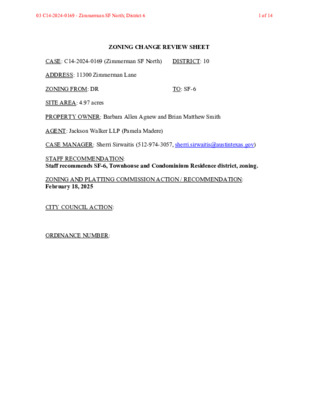
ZONING CHANGE REVIEW SHEET CASE: C14-2024-0169 (Zimmerman SF North) DISTRICT: 10 ADDRESS: 11300 Zimmerman Lane ZONING FROM: DR TO: SF-6 SITE AREA: 4.97 acres PROPERTY OWNER: Barbara Allen Agnew and Brian Matthew Smith AGENT: Jackson Walker LLP (Pamela Madere) CASE MANAGER: Sherri Sirwaitis (512-974-3057, sherri.sirwaitis@austintexas.gov) STAFF RECOMMENDATION: Staff recommends SF-6, Townhouse and Condominium Residence district, zoning. ZONING AND PLATTING COMMISSION ACTION / RECOMMENDATION: February 18, 2025 CITY COUNCIL ACTION: ORDINANCE NUMBER: 03 C14-2024-0169 - Zimmerman SF North; District 61 of 14 C14-2024-0169 2 ISSUES: N/A CASE MANAGER COMMENTS: The property in question is a 4.97 acre tract of land that is developed with a single-family residence, with a separate garage structure, that takes access to Zimmerman Lane. The properties to the north are developed with a single-family residence and undeveloped land and are zoned SF-2, DR and LO respectively. To the south, across Zimmerman Lane there is an undeveloped tract of land zoned DR. To the east, along Zimmerman Lane, there are townhouse/condominium residences and single-family residences zoned SF-6-CO. At the terminus of Zimmerman Lane, there is undeveloped property zoning SF-1. The property to the west, was zoned MF-2-CO through zoning case C14-2022-0044 and is currently undeveloped. At the northeast corner of N. FM 620 Road, there is a convenience storage/vehicle storage use (Longhorn Boat & Camper Storage) zoned SF-2 that was constructed prior to annexation by the city. The applicant in this case is requesting to rezone this site from DR, Development Reserve District, zoning to SF-6, Townhouse and Condominium Residence district, zoning to redevelop the property with single-family/condominium uses. This tract of land fronts onto Zimmerman Lane, a twenty foot wide collector street that dead ends into a cul-de-sac. Originally, Zimmerman Lane was projected to connect with Forsythia Drive, to the east, as part of the Arterial 8 extension. Arterial 8 (Forsythia Drive) was planned to be a ninety-foot arterial roadway that was to connect Loop 360 to Yaupon Drive. The City of Austin has deleted the plans to construct Arterial 8, due in part to BCCP issues and because of the City’s purchase of the Stennis Tract. Zimmerman Lane is a county roadway that was annexed by the city of Austin in 1997. There are no planned improvements for this portion of Zimmerman Lane and there will not be a traffic light constructed at the intersection of Zimmerman Lane and F.M. 620 because there is already a …
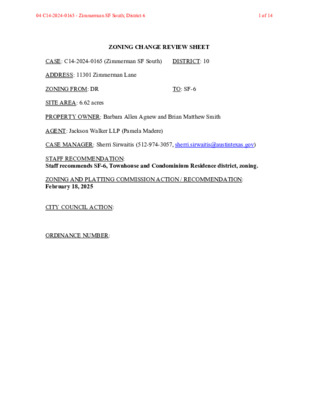
ZONING CHANGE REVIEW SHEET CASE: C14-2024-0165 (Zimmerman SF South) DISTRICT: 10 ADDRESS: 11301 Zimmerman Lane ZONING FROM: DR TO: SF-6 SITE AREA: 6.62 acres PROPERTY OWNER: Barbara Allen Agnew and Brian Matthew Smith AGENT: Jackson Walker LLP (Pamela Madere) CASE MANAGER: Sherri Sirwaitis (512-974-3057, sherri.sirwaitis@austintexas.gov) STAFF RECOMMENDATION: Staff recommends SF-6, Townhouse and Condominium Residence district, zoning. ZONING AND PLATTING COMMISSION ACTION / RECOMMENDATION: February 18, 2025 CITY COUNCIL ACTION: ORDINANCE NUMBER: 04 C14-2024-0165 - Zimmerman SF South; District 61 of 14 C14-2024-0165 ISSUES: N/A CASE MANAGER COMMENTS: 2 The property in question is a 6.62 acre vacant tract of land that takes access to Zimmerman Lane. The area to the north, across Zimmerman Lane, is developed with a single-family residence zoned DR. To the south there is an apartment complex that was zoned PUD as part of the Four Points Centre Planned Unit Development that takes access to North FM 620 Road. To the east, there are single family residences along the southern side of Zimmerman Lane and townhouse/condominium residences along the northern side of Zimmerman Lane that are zoned SF-6-CO. Toward the terminus of Zimmerman Lane, there is a single-family residence zoned DR and an undeveloped area zoned SF-1. The property to the west, is zoned MF-2 and is undeveloped. There is also undeveloped land on the northern side of Zimmerman Lane zoned MF-2-CO. The lot at the northeast corner of N. FM 620 Road, is developed with a convenience storage/vehicle storage use (Longhorn Boat & Camper Storage) zoned SF-2 that was constructed prior to annexation by the city. In addition, the lot at the southeast corner of Zimmerman Lane and N. FM 620 Road, is developed with a service station (Shell) and a restaurant use (Rudy’s Country Store and Bar-B-Que). The applicant in this case is requesting to rezone this site from DR zoning to SF-6 zoning to develop the property for single-family/condominium use. This tract of land fronts onto Zimmerman Lane, a twenty foot wide collector street that dead ends into a cul-de-sac. Originally, Zimmerman Lane was projected to connect with Forsythia Drive, to the east, as part of the Arterial 8 extension. Arterial 8 (Forsythia Drive) was planned to be a ninety-foot arterial roadway that was to connect Loop 360 to Yaupon Drive. The City of Austin deleted the plans to construct Arterial 8, due in part to BCCP issues and because of the City’s purchase …
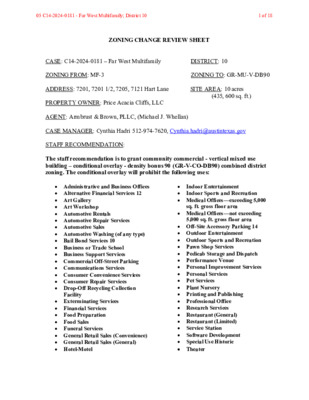
ZONING CHANGE REVIEW SHEET CASE: C14-2024-0181 – Far West Multifamily DISTRICT: 10 ZONING FROM: MF-3 ZONING TO: GR-MU-V-DB90 ADDRESS: 7201, 7201 1/2, 7205, 7121 Hart Lane SITE AREA: 10 acres (435, 600 sq. ft.) PROPERTY OWNER: Price Acacia Cliffs, LLC AGENT: Armbrust & Brown, PLLC, (Michael J. Whellan) CASE MANAGER: Cynthia Hadri 512-974-7620, Cynthia.hadri@austintexas.gov STAFF RECOMMENDATION: The staff recommendation is to grant community commercial - vertical mixed use building – conditional overlay - density bonus 90 (GR-V-CO-DB90) combined district zoning. The conditional overlay will prohibit the following uses: Administrative and Business Offices Alternative Financial Services 12 Art Gallery Art Workshop Automotive Rentals Automotive Repair Services Automotive Sales Automotive Washing (of any type) Bail Bond Services 10 Business or Trade School Business Support Services Commercial Off-Street Parking Communications Services Consumer Convenience Services Consumer Repair Services Drop-Off Recycling Collection Facility Exterminating Services Financial Services Food Preparation Food Sales Funeral Services General Retail Sales (Convenience) General Retail Sales (General) Hotel-Motel Indoor Entertainment Indoor Sports and Recreation Medical Offices—exceeding 5,000 sq. ft. gross floor area Medical Offices—not exceeding 5,000 sq. ft. gross floor area Off-Site Accessory Parking 14 Outdoor Entertainment Outdoor Sports and Recreation Pawn Shop Services Pedicab Storage and Dispatch Performance Venue Personal Improvement Services Personal Services Pet Services Plant Nursery Printing and Publishing Professional Office Research Services Restaurant (General) Restaurant (Limited) Theater Service Station Software Development Special Use Historic 05 C14-2024-0181 - Far West Multifamily; District 101 of 18 C14-2024-0181 2 Staff recommends granting the applicant’s modification request to not provide pedestrian-oriented commercial space (to provide 0% of the requirement). ZONING AND PLATTING COMMISSION ACTION / RECOMMENDATION: February 18, 2025: CITY COUNCIL ACTION: ORDINANCE NUMBER: ISSUES: In December 2023, Ordinance No. 20220609-080, Ordinance No. 20221201-056 and Ordinance No. 20221201-055 were invalidated. On March 11, 2024, Ordinance No. 20240229- 073, was enacted to create the “DB90” combining district, which amended City Code Title 25 (Land Development) to create a new zoning district for a density bonus program that grants 30 feet in height above the base zoning district, to a maximum of 90 feet, and modifies site development regulations including compatibility standards. Subsequently, the applicant submitted …
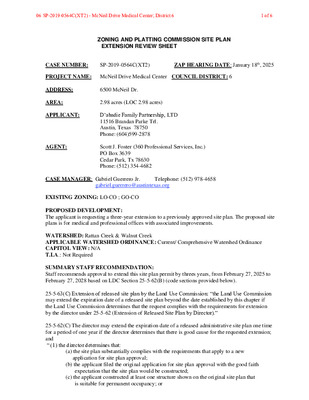
ZONING AND PLATTING COMMISSION SITE PLAN EXTENSION REVIEW SHEET CASE NUMBER: SP-2019-0564C(XT2) ZAP HEARING DATE: January 18th, 2025 PROJECT NAME: McNeil Drive Medical Center COUNCIL DISTRICT: 6 ADDRESS: 6500 McNeil Dr. AREA: 2.98 acres (LOC 2.98 acres) APPLICANT: AGENT: D’abadie Family Partnership, LTD 11516 Brandan Parke Trl. Austin, Texas 78750 Phone: (604)599-2878 Scott J. Foster (360 Professional Services, Inc.) PO Box 3639 Cedar Park, Tx 78630 Phone: (512) 354-4682 CASE MANAGER: Gabriel Guerrero Jr. Telephone: (512) 978-4658 gabriel.guerrero@austintexas.org EXISTING ZONING: LO-CO ; GO-CO PROPOSED DEVELOPMENT: The applicant is requesting a three-year extension to a previously approved site plan. The proposed site plans is for medical and professional offices with associated improvements. WATERSHED: Rattan Creek & Walnut Creek APPLICABLE WATERSHED ORDINANCE: Current/ Comprehensive Watershed Ordinance CAPITOL VIEW: N/A T.I.A.: Not Required SUMMARY STAFF RECOMMENDATION: Staff recommends approval to extend this site plan permit by threes years, from February 27, 2025 to February 27, 2028 based on LDC Section 25-5-62(B) (code sections provided below). 25-5-63(C) Extension of released site plan by the Land Use Commission: “the Land Use Commission may extend the expiration date of a released site plan beyond the date established by this chapter if the Land Use Commission determines that the request complies with the requirements for extension by the director under 25-5-62 (Extension of Released Site Plan by Director).” 25-5-62(C) The director may extend the expiration date of a released administrative site plan one time for a period of one year if the director determines that there is good cause for the requested extension; and “ (1) the director determines that: (a) the site plan substantially complies with the requirements that apply to a new application for site plan approval; (b) the applicant filed the original application for site plan approval with the good faith expectation that the site plan would be constructed; (c) the applicant constructed at least one structure shown on the original site plan that is suitable for permanent occupancy; or 06 SP-2019-0564C(XT2) - McNeil Drive Medical Center; District 61 of 6 (d) the applicant has constructed a significant portion of the infrastructure required for development of the original site plan; and” PLANNING COMMISSION ACTION: Related Case: N/A 06 SP-2019-0564C(XT2) - McNeil Drive Medical Center; District 62 of 6 SUMMARY COMMENTS ON SITE PLAN: Land Use: The submitted site plan is for the construction of three buildings totaling 19,805 GSF with associated drives, utilities, landscaping …
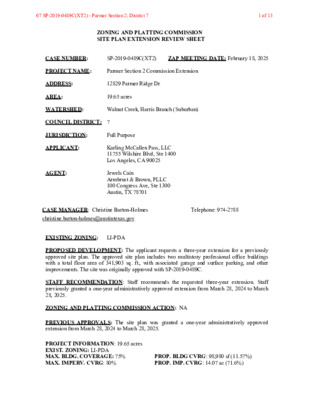
ZONING AND PLATTING COMMISSION SITE PLAN EXTENSION REVIEW SHEET CASE NUMBER: SP-2019-0489C(XT2) ZAP MEETING DATE: February 18, 2025 PROJECT NAME: Parmer Section 2 Commission Extension ADDRESS: 12829 Parmer Ridge Dr AREA: 19.65 acres WATERSHED: Walnut Creek, Harris Branch (Suburban) COUNCIL DISTRICT: 7 JURISDICTION: Full Purpose APPLICANT: AGENT: Karling McCallen Pass, LLC 11755 Wilshire Blvd, Ste 1400 Los Angeles, CA 90025 Jewels Cain Armbrust & Brown, PLLC 100 Congress Ave, Ste 1300 Austin, TX 78701 CASE MANAGER: Christine Barton-Holmes Telephone: 974-2788 christine.barton-holmes@austintexas.gov EXISTING ZONING: LI-PDA PROPOSED DEVELOPMENT: The applicant requests a three-year extension for a previously approved site plan. The approved site plan includes two multistory professional office buildings with a total floor area of 341,903 sq. ft., with associated garage and surface parking, and other improvements. The site was originally approved with SP-2019-0489C. STAFF RECOMMENDATION: Staff recommends the requested three-year extension. Staff previously granted a one-year administratively approved extension from March 28, 2024 to March 28, 2025. ZONING AND PLATTING COMMISSION ACTION: NA PREVIOUS APPROVALS: The site plan was granted a one-year administratively approved extension from March 28, 2024 to March 28, 2025. PROJECT INFORMATION: 19.65 acres EXIST. ZONING: LI-PDA MAX. BLDG. COVERAGE: 75% MAX. IMPERV. CVRG: 80% PROP. BLDG CVRG: 98,980 sf (11.57%) PROP. IMP. CVRG: 14.07 ac (71.6%) 07 SP-2019-0489C(XT2) - Parmer Section 2; District 71 of 13 A COMPARISON OF THE APPROVED PROJECT WITH CURRENT REGULATIONS WATERSHED ORDINANCE: This project complies with applicable watershed regulations. LAND USE: The site plan complies with all applicable zoning regulations. ENVIRONMENTAL: All environmental comments have been cleared. TRANSPORTATION: All transportation comments have been cleared. SURROUNDING CONDITIONS: Zoning/ Land Use North: South: East: West: STREET: E Parmer Ln Parmer Ridge Dr Harris Ridge Blvd LI-PDA (Offices) ROW, then LI-PDA (E Parmer Ln, then offices) ROW, then GR-MU (Harris Ridge Blvd., multifamily) ROW, then LI-PDA (Parmer Ridge Dr, undeveloped) R.O.W. ~200’ ~80’ ~125’ SURFACING ~175’ ~60’ ~73’ CLASSIFICATION Regional Mobility Corridor Mobility Corridor Mobility NEIGHBORHOOD ORGANIZATION: Austin Lost and Found Pets Friends of Austin Neighborhoods Neighborhood Empowerment Foundation North Growth Corridor Alliance Pflugerville Independent School District Save Our Springs Alliance SELTexas Sierra Club, Austin Regional Group TechRidge Neighbors Yager Community 07 SP-2019-0489C(XT2) - Parmer Section 2; District 72 of 13 ARMBRUST & BROWN, PLLC A T T O R N E Y S A N D C O U N S E L O R S 100 CONGRESS AVENUE, SUITE 1300 AUSTIN, TEXAS …
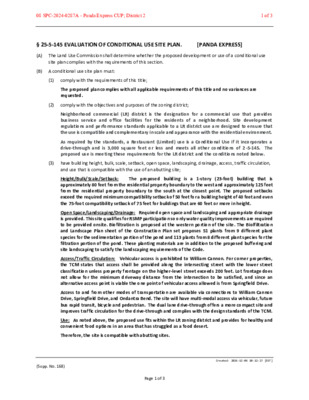
§ 25-5-145 EVALUATION OF CONDITIONAL USE SITE PLAN. [PANDA EXPRESS] (A) The Land Use Commission shall determine whether the proposed development or use of a conditional use site plan complies with the requirements of this section. (B) A conditional use site plan must: (1) comply with the requirements of this title; The proposed plan complies with all applicable requirements of this title and no variances are requested. (2) comply with the objectives and purposes of the zoning district; Neighborhood commercial (LR) district is the designation for a commercial use that provides business service and office facilities for the residents of a neighborhood. Site development regulations and performance standards applicable to a LR district use are designed to ensure that the use is compatible and complementary in scale and appearance with the residential environment. As required by the standards, a Restaurant (Limited) use is a Conditional Use if it incorporates a drive-through and is 3,000 square feet or less and meets all other conditions of 2-5-145. The proposed use is meeting these requirements for the LR district and the conditions noted below. (3) have building height, bulk, scale, setback, open space, landscaping, drainage, access, traffic circulation, and use that is compatible with the use of an abutting site; Height/Bulk/Scale/Setback: The proposed building is a 1-story (23-foot) building that is approximately 80 feet from the residential property boundary to the west and approximately 125 feet from the residential property boundary to the south at the closest point. The proposed setbacks exceed the required minimum compatibility setback of 50 feet for a building height of 40 feet and even the 75-foot compatibility setback of 75 feet for buildings that are 60 feet or more in height. Open Space/Landscaping/Drainage: Required open space and landscaping and appropriate drainage is provided. This site qualifies for RSMP participation so only water quality improvements are required to be provided onsite. Biofiltration is proposed at the western portion of the site. The Biolfiltration and Landscape Plan sheet of the Construction Plan set proposes 51 plants from 9 different plant species for the sedimentation portion of the pond and 113 plants from 8 different plant species for the filtration portion of the pond. These planting materials are in addition to the proposed buffering and site landscaping to satisfy the landscaping requirements of the Code. Access/Traffic Circulation: Vehicular access is prohibited to William Cannon. For corner properties, the TCM states that …
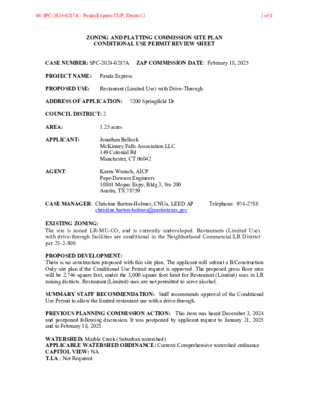
ZONING AND PLATTING COMMISSION SITE PLAN CONDITIONAL USE PERMIT REVIEW SHEET CASE NUMBER: SPC-2024-0287A ZAP COMMISSION DATE: February 18, 2025 PROJECT NAME: Panda Express PROPOSED USE: Restaurant (Limited Use) with Drive-Through ADDRESS OF APPLICATION: 7200 Springfield Dr COUNCIL DISTRICT: 2 AREA: 1.25 acres APPLICANT: AGENT: Jonathan Bellock McKinney Falls Association LLC 149 Colonial Rd Manchester, CT 06042 Karen Wunsch, AICP Pape-Dawson Engineers 10801 Mopac Expy, Bldg 3, Ste 200 Austin, TX 78759 CASE MANAGER: Christine Barton-Holmes, CNUa, LEED AP Telephone: 974-2788 christine.barton-holmes@austintexas.gov EXISTING ZONING: The site is zoned LR-MU-CO, and is currently undeveloped. Restaurants (Limited Use) with drive-through facilities are conditional in the Neighborhood Commercial/LR District per 25-2-809. PROPOSED DEVELOPMENT: There is no construction proposed with this site plan. The applicant will submit a B/Construction Only site plan if the Conditional Use Permit request is approved. The proposed gross floor area will be 2,746 square feet, under the 3,000 square foot limit for Restaurant (Limited) uses in LR zoning districts. Restaurant (Limited) uses are not permitted to serve alcohol. SUMMARY STAFF RECOMMENDATION: Staff recommends approval of the Conditional Use Permit to allow the limited restaurant use with a drive-through. PREVIOUS PLANNING COMMISSION ACTION: This item was heard December 3, 2024 and postponed following discussion. It was postponed by applicant request to January 21, 2025 and to February 18, 2025. WATERSHED: Marble Creek (Suburban watershed) APPLICABLE WATERSHED ORDINANCE: Current/ Comprehensive watershed ordinance CAPITOL VIEW: NA T.I.A.: Not Required 08 SPC-2024-0287A - Panda Express CUP; District 21 of 8 PROPOSED F.A.R.: .05 PROPOSED BLDG. CVRG: 5% PROPOSED IC:65.91% PROJECT INFORMATION 1.25 acres EXIST. ZONING: LR-MU-CO (undeveloped) ALLOWED F.A.R.: .5 MAX. BLDG. COVERAGE: 50% MAX. IMPERVIOUS CVRG.: 80% SUMMARY COMMENTS ON SITE PLAN: Land Use: The applicant is requesting a Conditional Use Permit to build a Restaurant (Limited) with a drive-through facility, which is a conditional use in the LR zoning district. The B site plan will comply with all requirements of the Land Development Code prior to its release. Environmental: The site is in the Marble Creek Suburban watershed. The B plan will comply with all Environmental regulations upon its release. Transportation: As currently designed, access will be off Springfield Drive. The site sits on the southwest corner of E William Cannon Dr and Springfield Dr, and the B plan will comply with all Transportation requirements upon its release. SURROUNDING CONDITIONS: Zoning/ Land use North: E William Cannon Drive East: Springfield Drive, …